
The Bottom Line
Pros
- + Gaming
- + Throughput
- + User experience
Cons
- - Poor PS5 performance
- - Immature firmware
Should you buy it?
AvoidConsiderShortlistBuyIntroduction & Drive Details
Consumer PCIe Gen5 SSDs have been a thing for well over a year now. To this point, with one lone exception, all have been Phison E26/Micron B58R based. To this point, Phison has been able to stay out front of its perennial competitors, essentially owning the consumer PCIe Gen5 SSD market - lock, stock, and barrel.
Well, today that changes as TeamGroup has launched the first of undoubtedly many to come SSDs powered by the Chinese-based controller company Yingren Technology or InnoGrit as it's known outside of China.
The T-Force GE Pro is powered by the InnoGrit IG5666 PCIe Gen5 x4 eight-channel controller. This controller is made on a 12nm process, making it compact and power efficient while at the same time capable of delivering well over 14,000 MB/s sequential throughput.
Now, as most of you know, the controller is only half the story and arguably not the most important half. The other and more important half of the story, as we see it, is the flash with which the drive is arrayed. We assumed that when we fired up our flash ID tool, we would be seeing some Micron B58R or even some BiCS 6 listed, but nope, instead it's Chinese-made YMTC 232L 2,400 MT 6-Plane TLC:
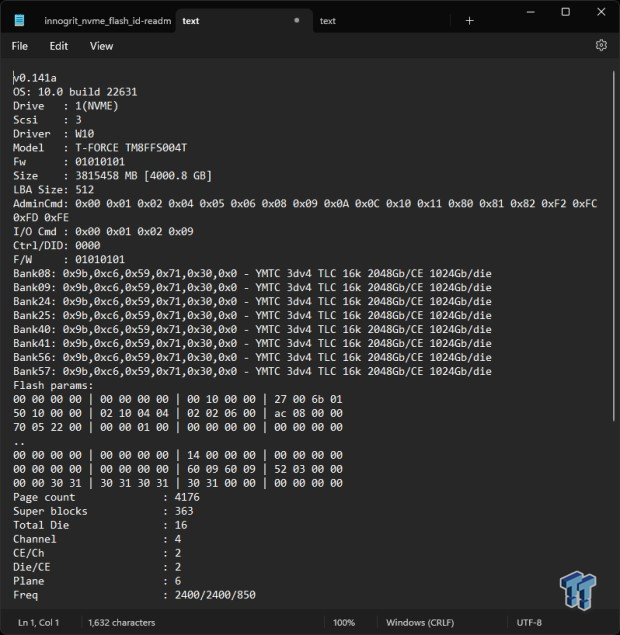
This speedy flash has indeed impressed us previously, having arrayed all the 100% Chinese-made Maxio MAP1602 controlled DRAMless SSDs we've tested over the past year.
Since encountering YMTC's 232L flash, we've wanted to see what it could do behind a full-on enthusiast-class 8-channel controller. Well, today is the day we get our first look. The T-Force GE PRO is set to compete with a whole host of 14,000 MB/s class Phison E26-controlled SSDs. Currently, these E26-controlled speed demons are the fastest and most powerful consumer SSDs on the planet, but they are also the most expensive as well.
As we see it, the T-Force GE PRO is a welcome sight, at long last bringing some competition into the arena, the consequences of which should result in better pricing for those itching to take the 14,000 MB/s plunge. Indeed, as we look across the interwebs, the 4TB GE PRO we have in the lab today can be had for roughly $100 to $150 less than its E26 controlled equivalent. Excellent.
As most of our readers know, because we've pointed it out ad nauseam over the years, sequential throughput does not necessarily equate to real-world performance. Fast can be one thing and powerful another. With that said, we need to mention firmware as it relates to the GE PRO. We've experienced both the bad and the good. Our first experience was with the following firmware:
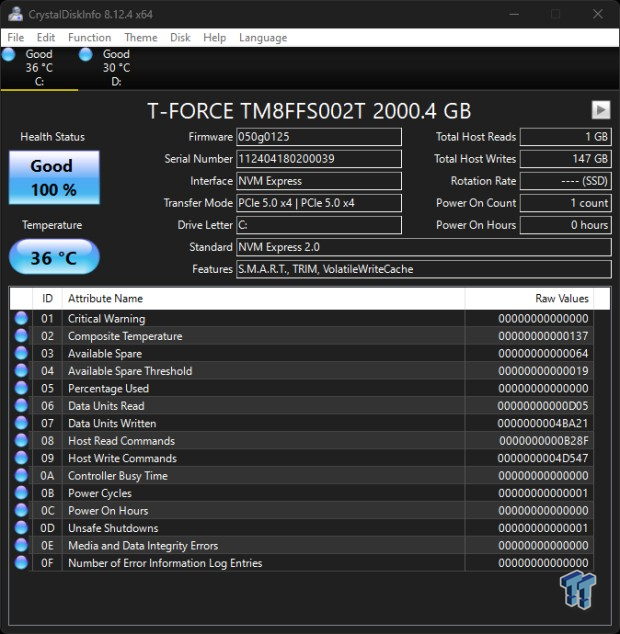
This firmware was obviously not ready for primetime even though it was "fast," as evidenced by the following:
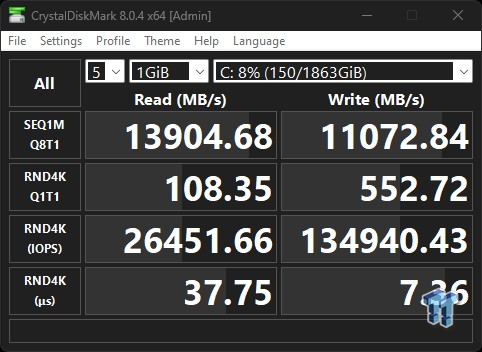
It was not powerful, as evidenced by the following:
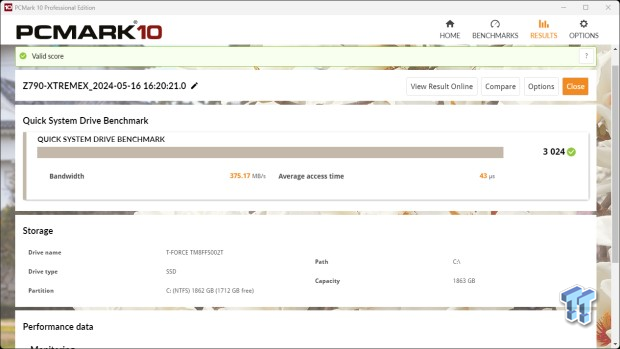
With a score of only 3,024, that would make it by far the lowest real-world performer appearing on our chart. 4,000 MB/s SSDs do better than that. So yeah, fast and powerful can be two different animals altogether. We point this out as a service to our readers that if you, by chance, get a drive with 050g0125 firmware. You will need to update it to get powerful performance like this:
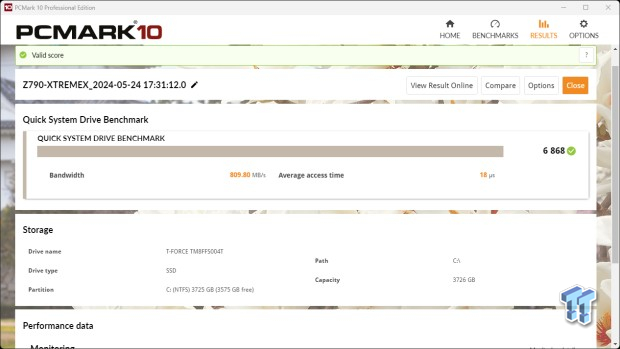
That's more like it! Impressive.
One of the knocks on PCIe Gen5 SSDs is they run hot. This is true, but we must keep it in context. With double the throughput of PCIe Gen4, there is naturally going to be more heat. However, the additional heat is easily mitigated with proper cooling, ranging from adequately designed motherboard heatsinks to various cooling solutions provided by the SSD retailer. One of the best retailer provided cooling options we've encountered to date is TeamGroup's own AF1 tower cooler which we first tested along with TeamGroup's T-Force Z540 12,000 MB/s class SSD.
When tested with the T-Force Z540 2TB, the AF1 cooler delivered brilliantly, keeping the 12,000 MB/s class SSD cooled to a maximum of 56c and doing so in near silence. Right now, as a promotion over at Newegg, TeamGroup is including an all-black AF1 cooler with a purchase of its T-Force GE PRO SSDs. This cooler is super effective, as evidenced by the following:
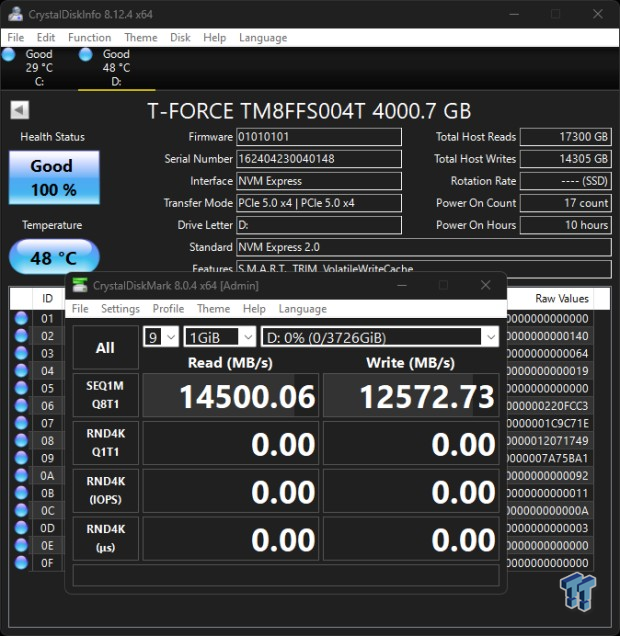
The hottest we could get our GE PRO was a nice and cool 48c. Impressive. This also indicates that the IG5666 controller runs a bit cooler than its E26-controlled counterparts, possibly by as much as 10c cooler at the 14,000 MB/s class. Additionally, we can't help but notice that 14,500 MB/s throughput is the highest we've ever attained with a 4TB retail SSD. Wow.
Okay, now let's get into the review so we can see exactly what this 100% Chinese-made SSD can do for you by the numbers.
Drive Details
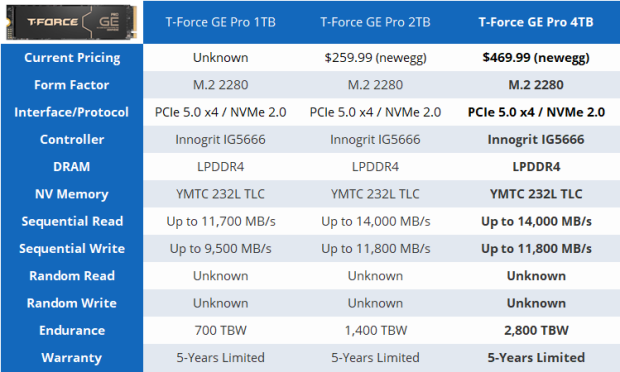
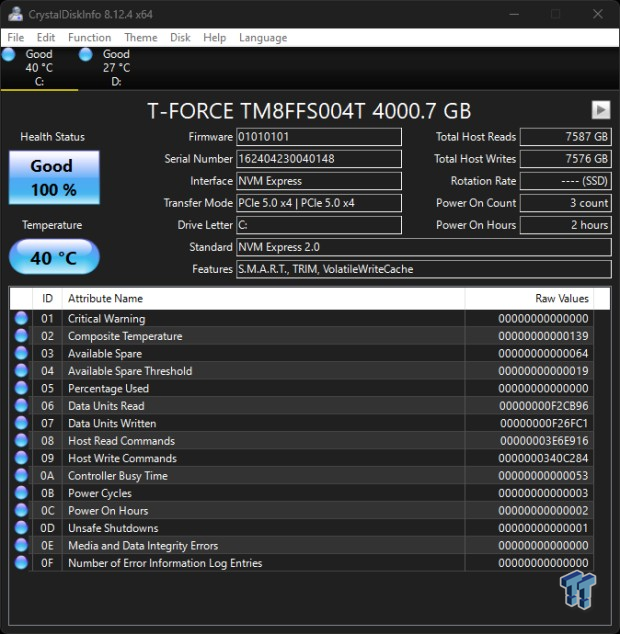
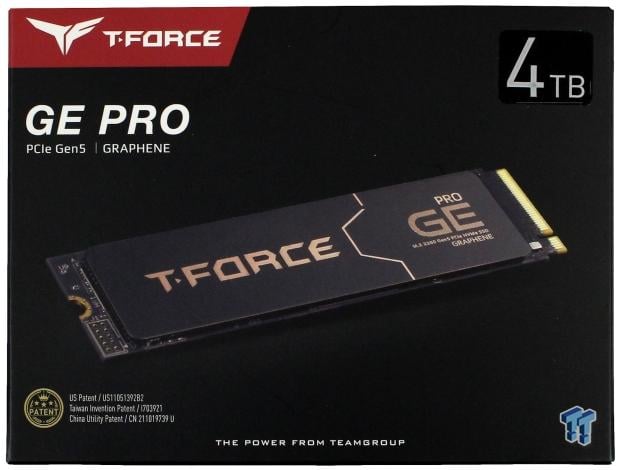
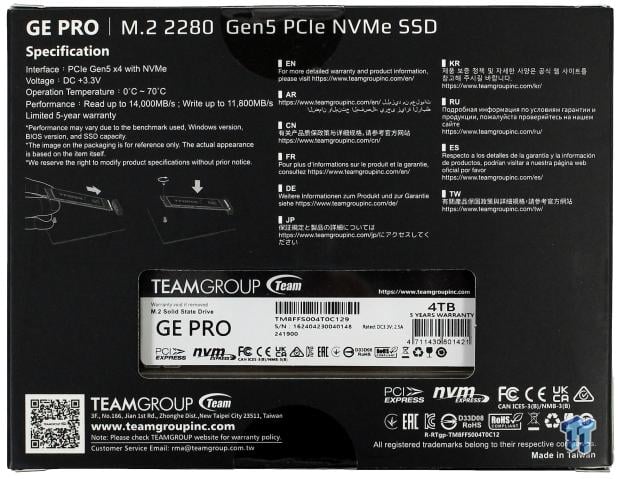


TeamGroup's T-Force GE PRO is currently available at Newegg at the 2TB and 4TB capacity points. A quick look at the TeamGroup T-Force GE PRO webpage reveals a 1TB model is also in the works.
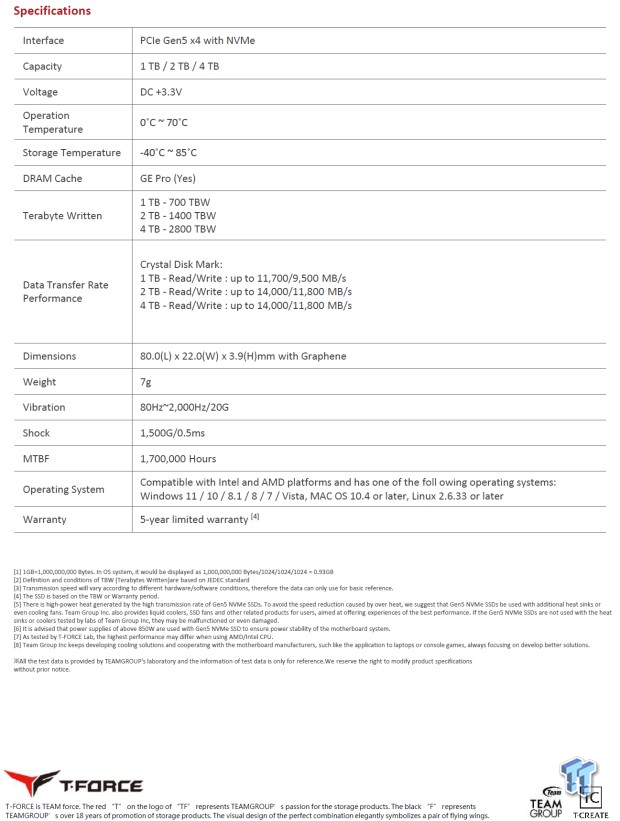
Jon's Test System Specifications
Intel Test System
- Motherboard: GIGABYTE AORUS Z790 Xtreme X
- CPU: Intel Core i9-14900KS - Buy from Amazon
- Cooler: Alphacool Eissturm Hurricane Copper 45 - Buy from Amazon
- RAM: Patriot Viper Xtreme 5 8000 48GB - Buy from Amazon
- Graphics Card: MSI SUPRIM X RTX 3080 12GB - Buy from Amazon
- Case: PrimoChill's Praxis Wetbench - Buy from Amazon
- Power Supply: be quiet! Dark Power Pro 12 1200W - Buy from Amazon
- OS: Microsoft Windows 11 Pro 64-bit - Buy from Amazon
AMD Test System
- Motherboard: GIGABYTE X670E AORUS Master
- CPU: AMD Ryzen 9 7950X - Buy from Amazon
- Cooler: Alphacool Eissturm Hurricane Copper 45 - Buy from Amazon
- RAM: Sabrent Rocket DDR5 32GB - Buy from Amazon
- Graphics Card: MSI SUPRIM X RTX 3080 12GB - Buy from Amazon
- Case: PrimoChill's Praxis Wetbench - Buy from Amazon
- Power Supply: be quiet! Dark Power Pro 12 1200W - Buy from Amazon
- OS: Microsoft Windows 11 Pro 64-bit - Buy from Amazon
Because we at TweakTown like to be first at everything whenever we can, we will present our storage performance results for the test subject on both 14th Gen Intel and 7000 Series AMD platforms going forward for the foreseeable future. Because Intel still delivers the best real-world storage performance, (Look Here), our running chart will continue to be Intel-based until AMD can deliver better real-world storage performance than its rival.

Sony PlayStation 5 - M.2 Storage Expansion
PS5 Read Performance
With Sony's wildly popular PlayStation 5 console now enabled for M.2 NVMe SSDs to be used as fast storage expansion, we are including results for PS5 compatible SSDs we test as a part of our reviews going forward.
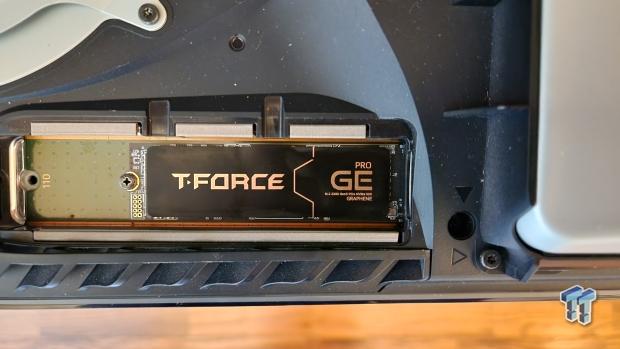
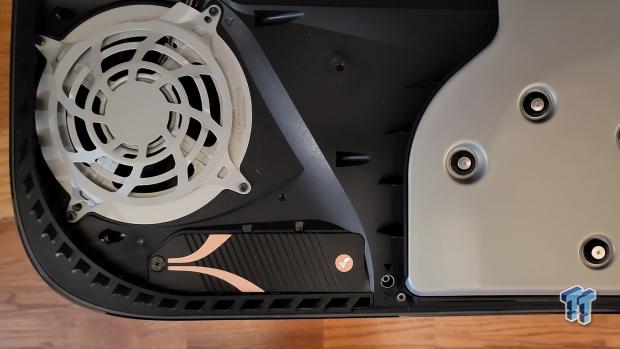
For SSDs that don't have an adequately sized PS5 compatible heatsink or other SSDs where the heatsink provided doesn't fit right and can be removed, we both use and recommend Sabrent's unparalleled PS5 heatsink available HERE.
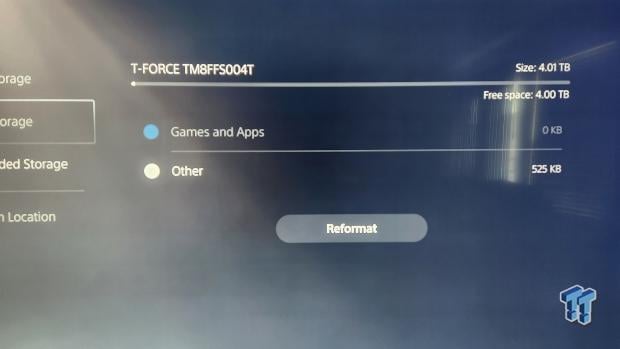
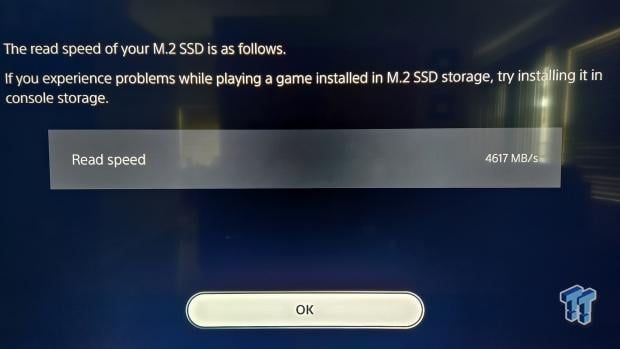
We only chart SSDs that can deliver a minimum of 5,500 MB/s read, which is Sony's original recommendation.
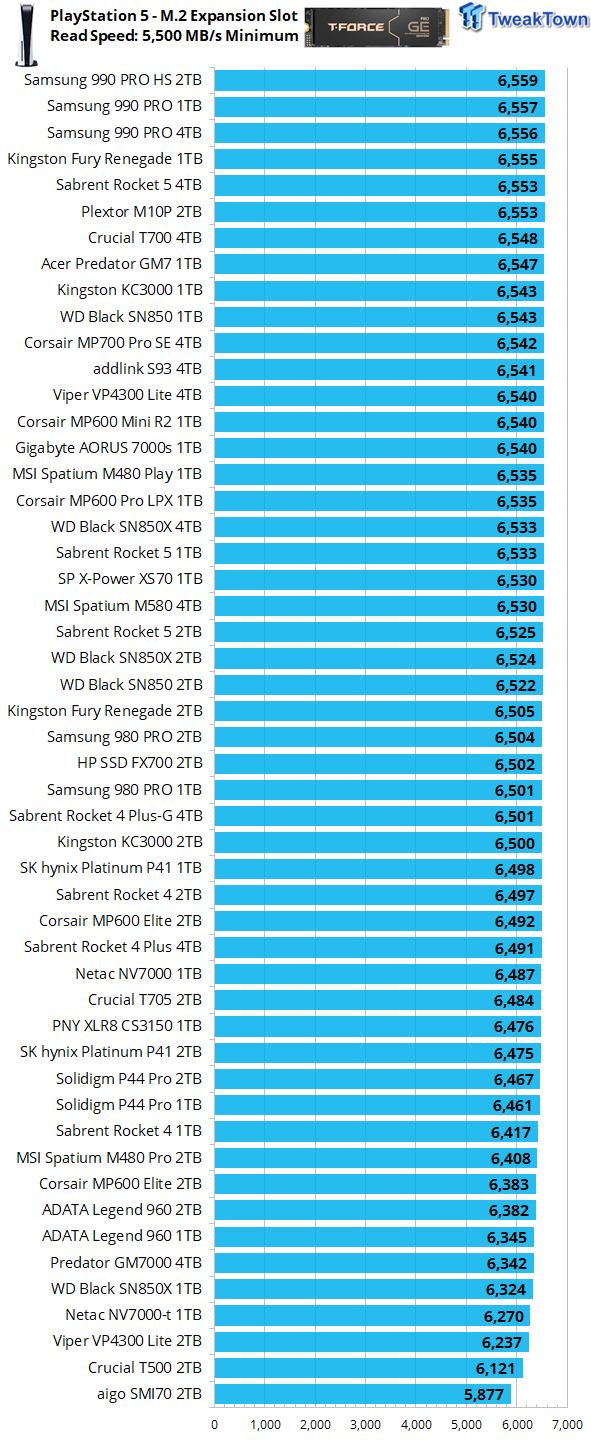
A result here of 4,600 MB/s is not good enough to make the chart. It is highly likely that a future firmware update would remedy this as the drive is plenty fast enough on paper to make the cut.
Synthetic Benchmarks: CDM, Anvil, ATTO
CrystalDiskMark
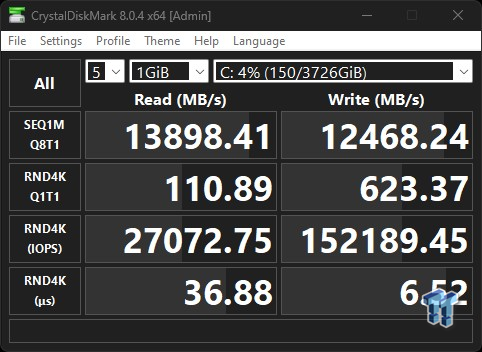
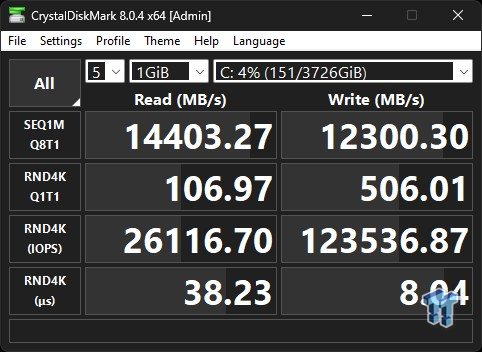
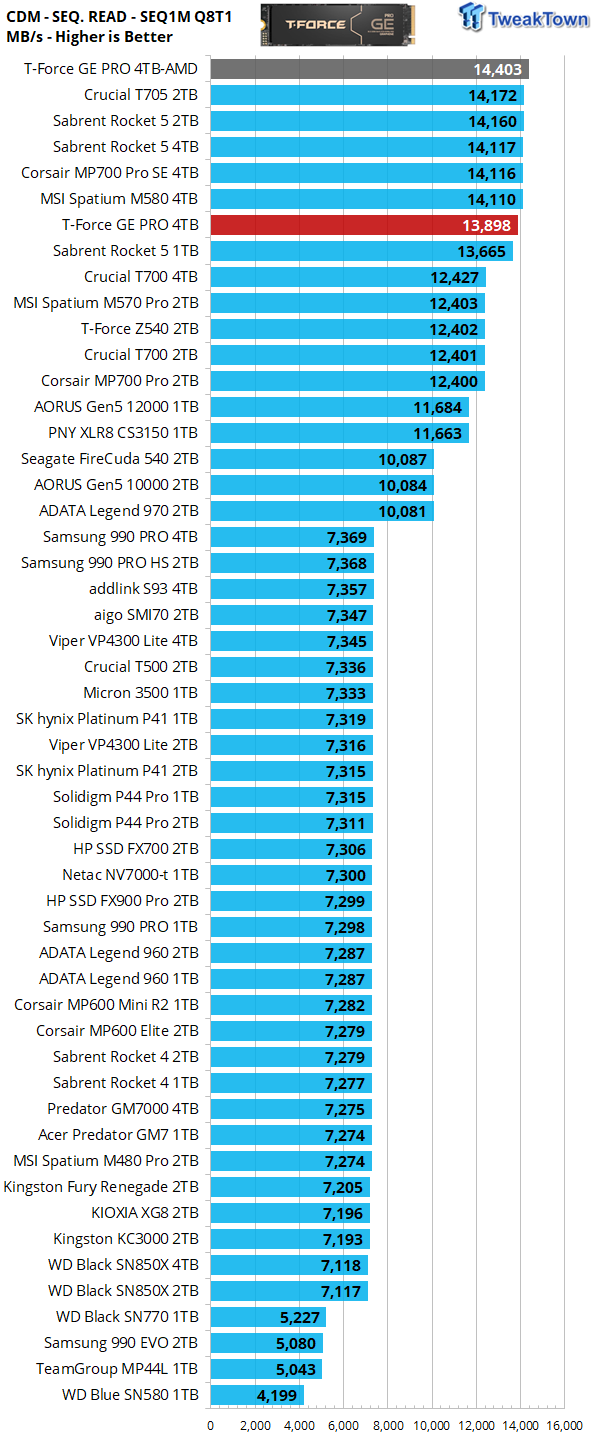
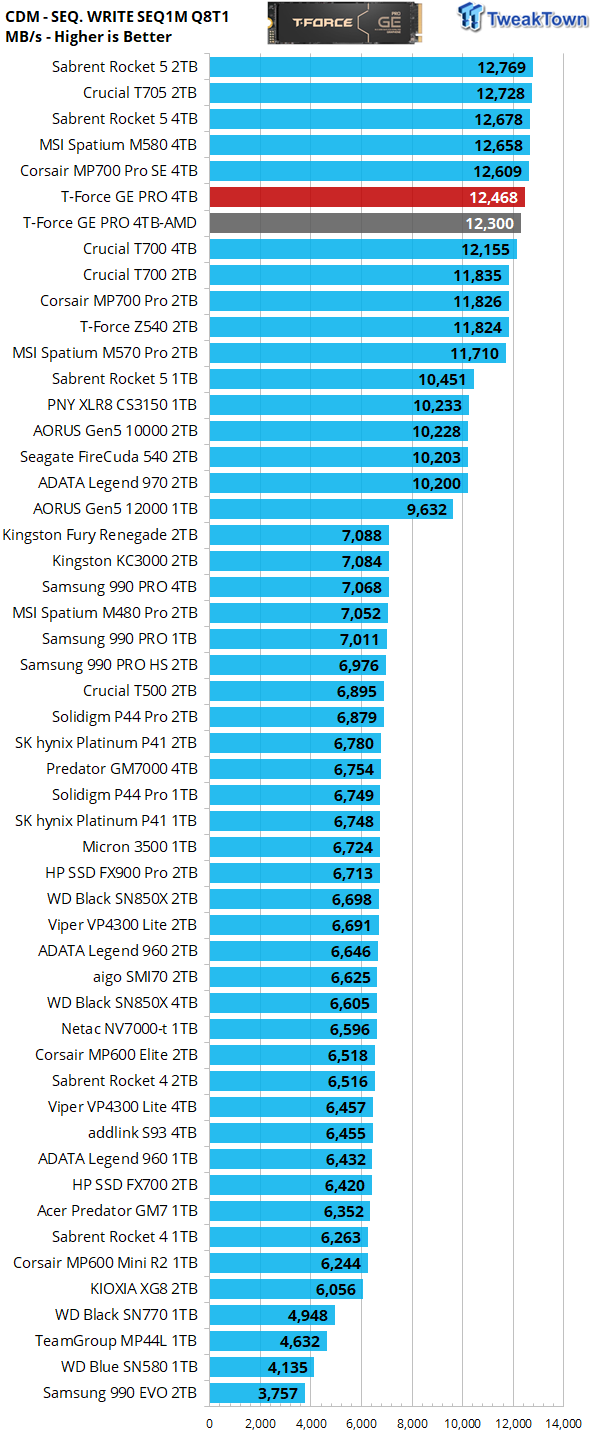
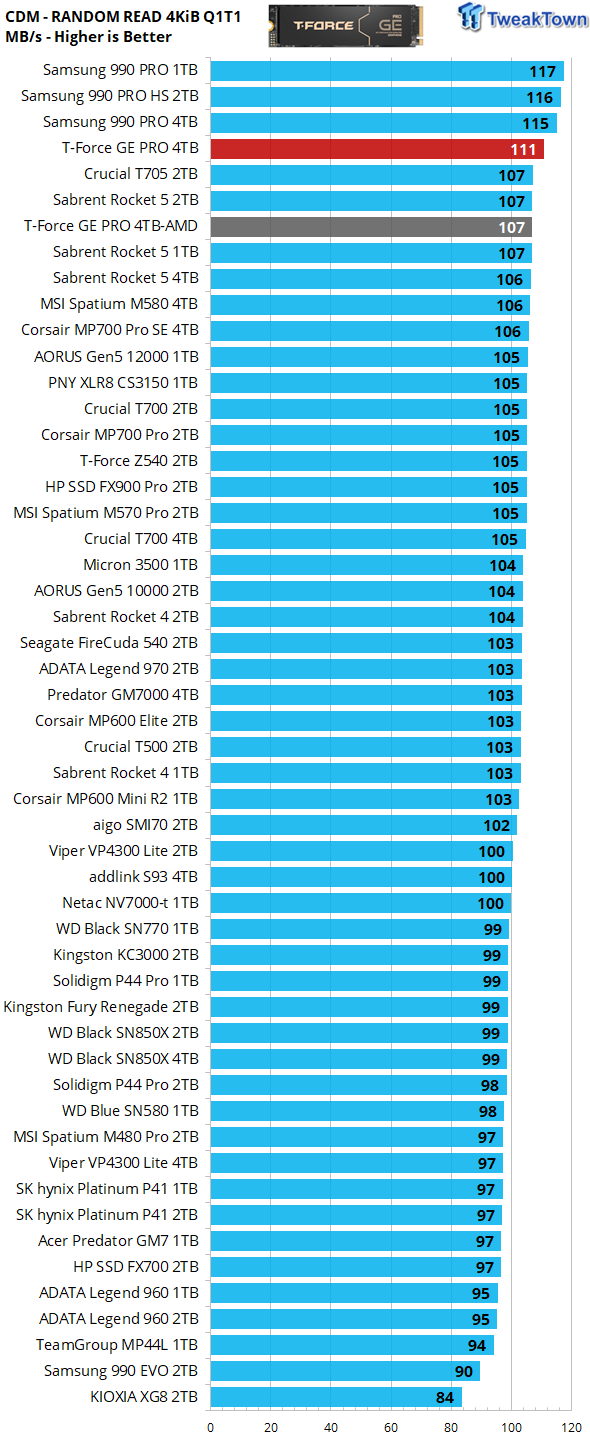
We employ CDM as our standard measurement for both sequential throughput and Q1T1 random read. In terms of sequential throughput, we find our test subject fully capable of exceeding quoted up to factory throughput specifications. And as mentioned previously, at 14,400 MB/s on our AMD platform, it is delivering the highest throughput of any 4TB SSD we've encountered to date, eclipsing the 4TB E26 Max14um SSDs by almost 300 MB/s, even on AMD. YMTC 232L TLC is indeed fast.
Now, looking at its massive Q1T1 random read speed of 111 MB/s, which is better than E26-controlled SSDs can muster, we wonder if we could have a new performance champion on our hands. Let's investigate further.
Anvil's Storage Utilities
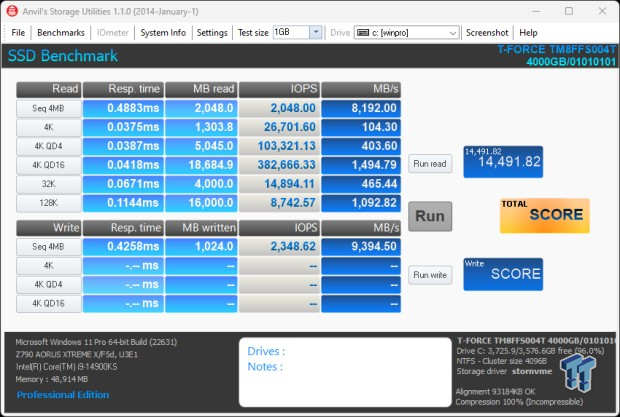
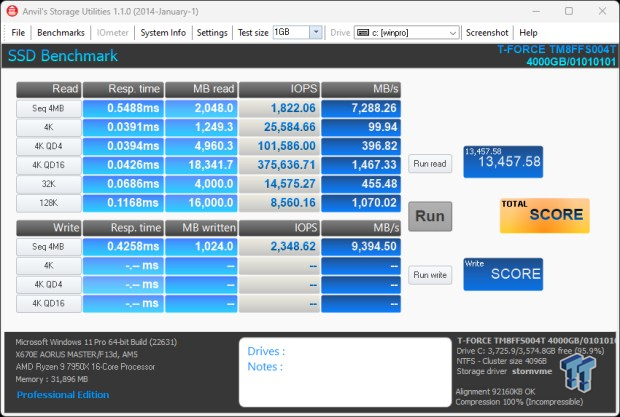
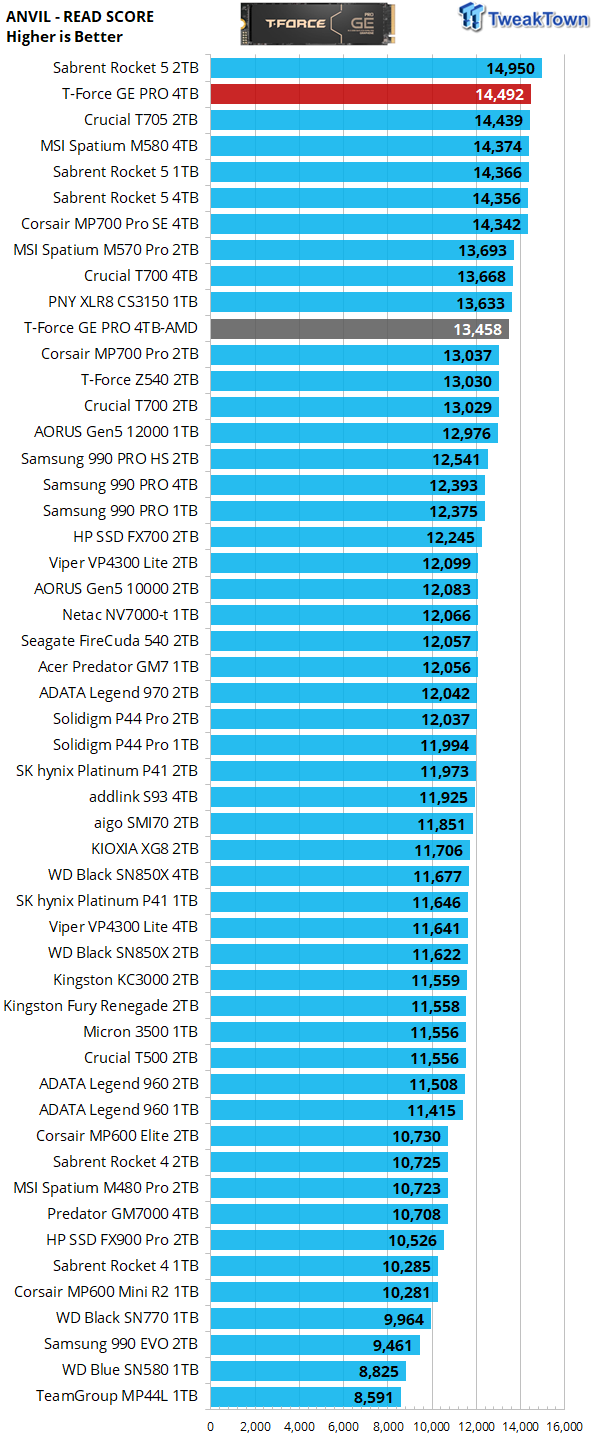
A read score of 14,492 is the second best we've achieved to date for any flash-based SSD and, again, the highest we've attained from any 4TB SSD. Outstanding.
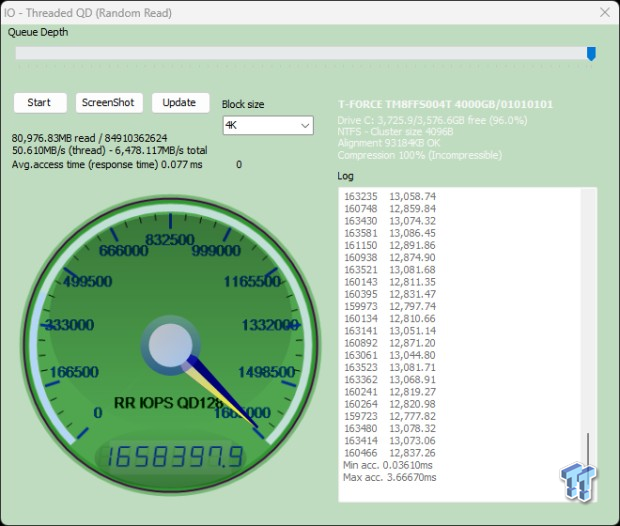
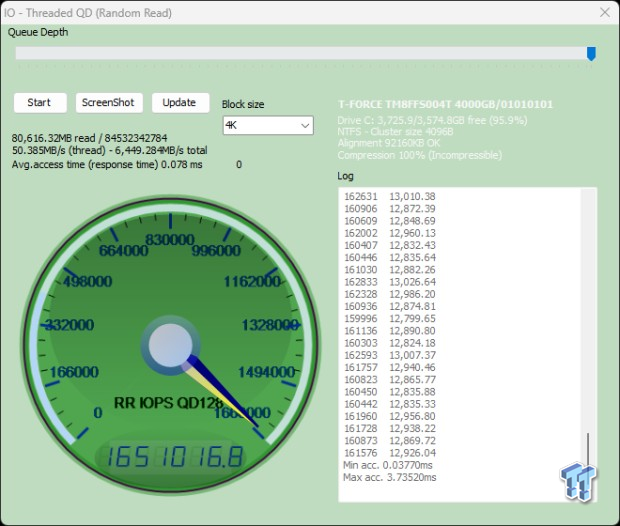
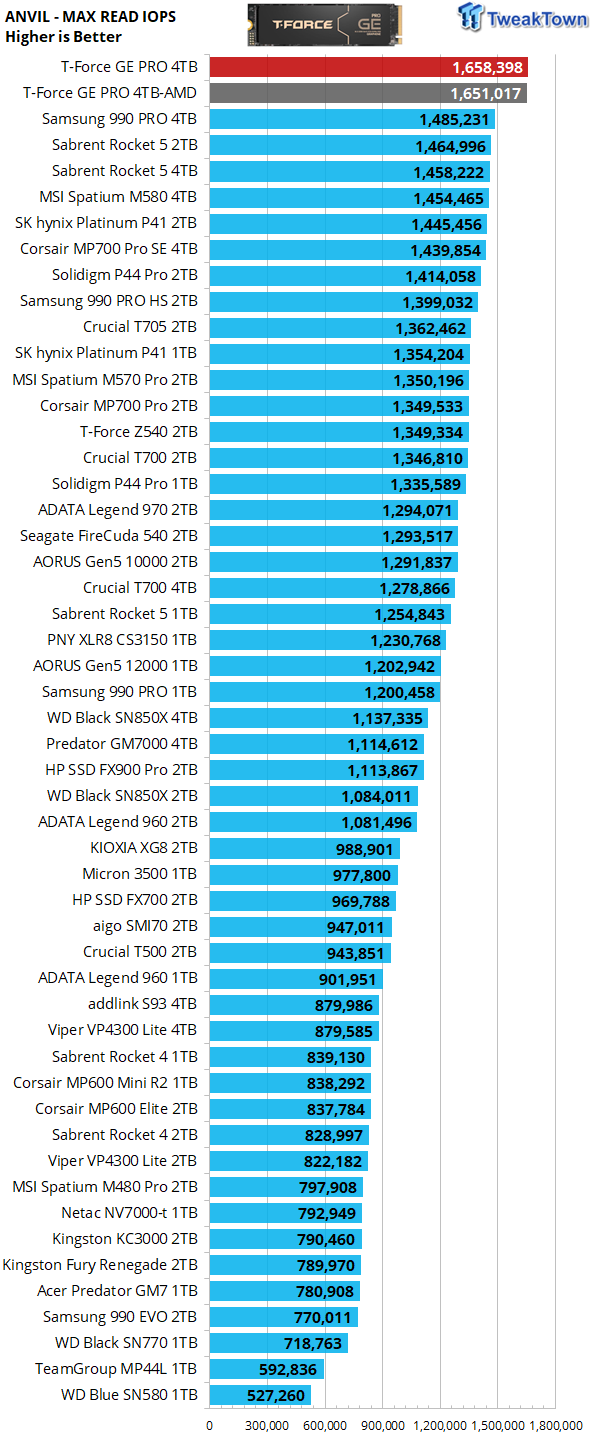
We employ Anvil's random read test as our standard for measuring max random read IOPS. This test is very accurate as it at its core is Iometer skinned over. We test at QD128. At 1.65 million RR IOPS, our InnoGrit powered contender delivers a new lab record. Wow.
ATTO
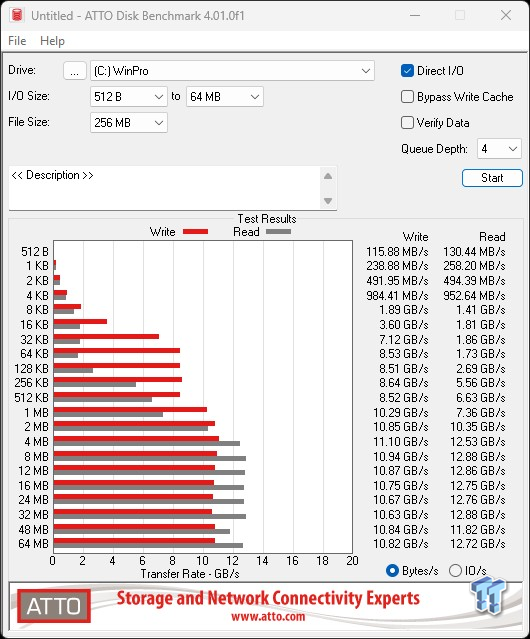
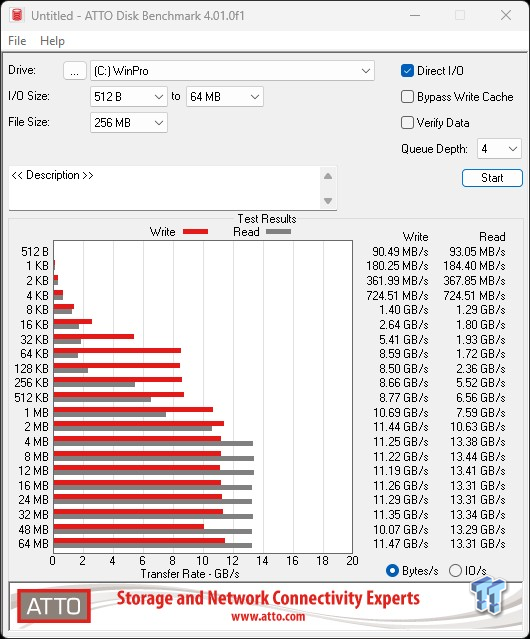
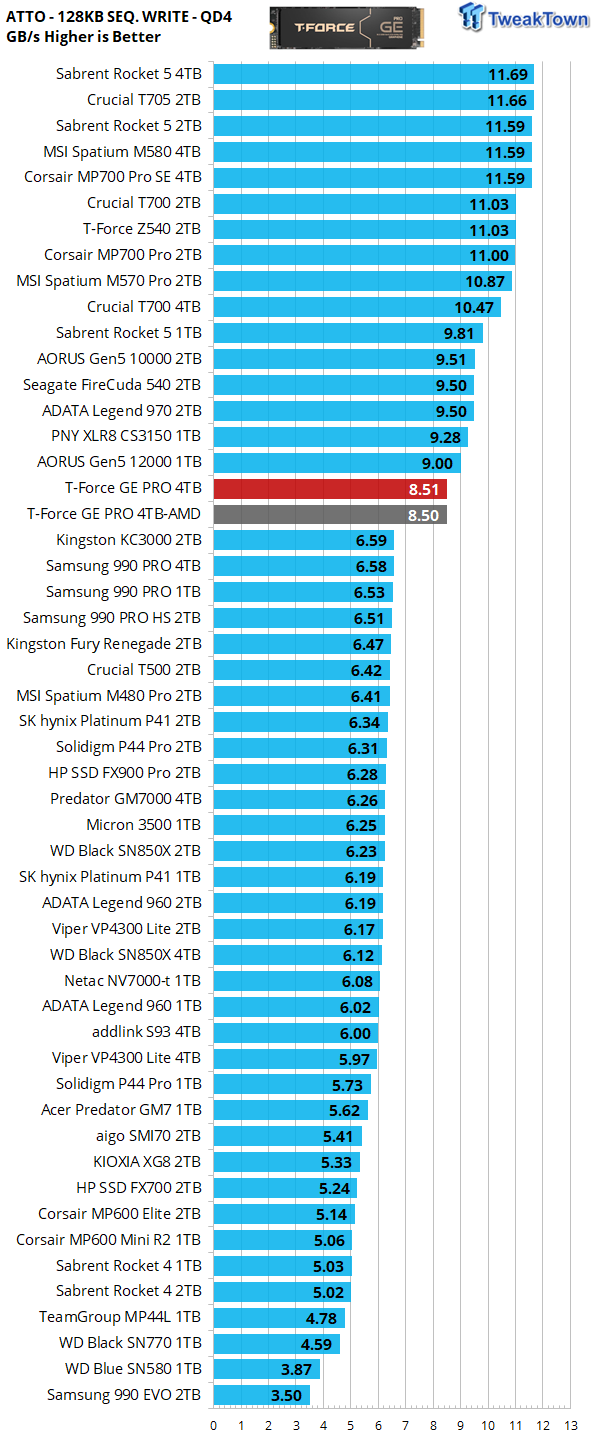
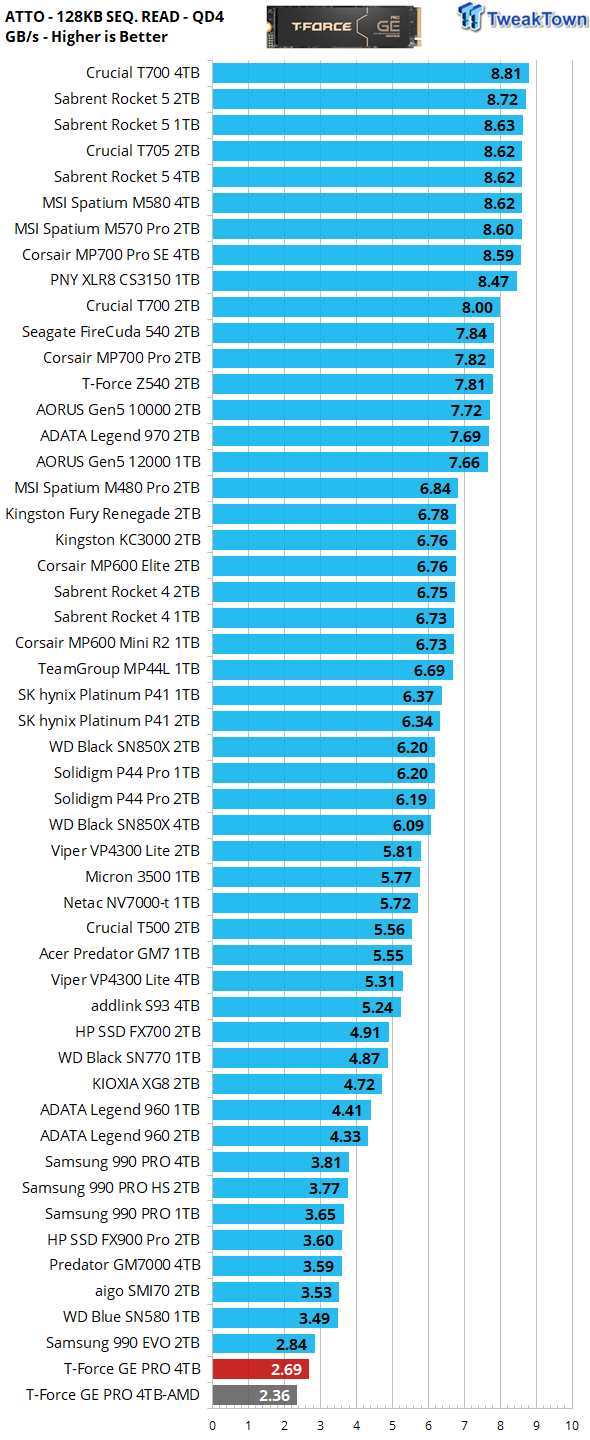
ATTO gives us a clear picture of what transfer sizes a particular SSD favors in terms of QD4 sequential throughput. We chart 128K transfers. At a queue depth of four, the GE PRO 4TB favors sequential transfers of 4MB or larger when serving data to the host (reading) and 2MB or larger when programming (writing) data. At 128K where we chart, read throughput doesn't look so good. This could potentially be the very same issue with its poor PS5 performance. This SSD prefers large sequential chunks.
Real-World Testing: Transfers, 3DMark SSD Gaming Test, PCM10 Storage
Transfer Rates
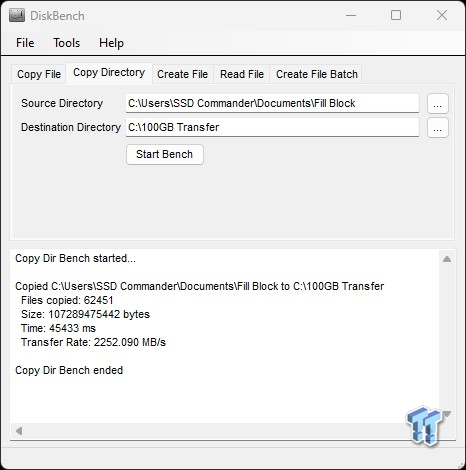
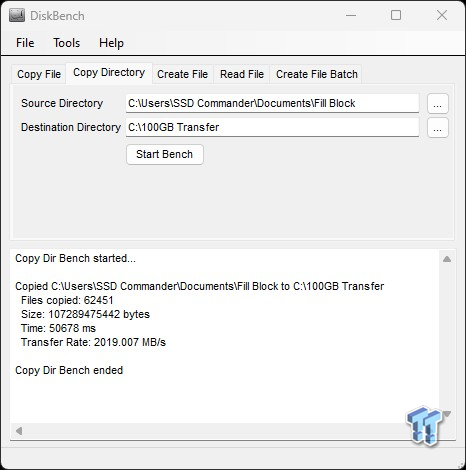
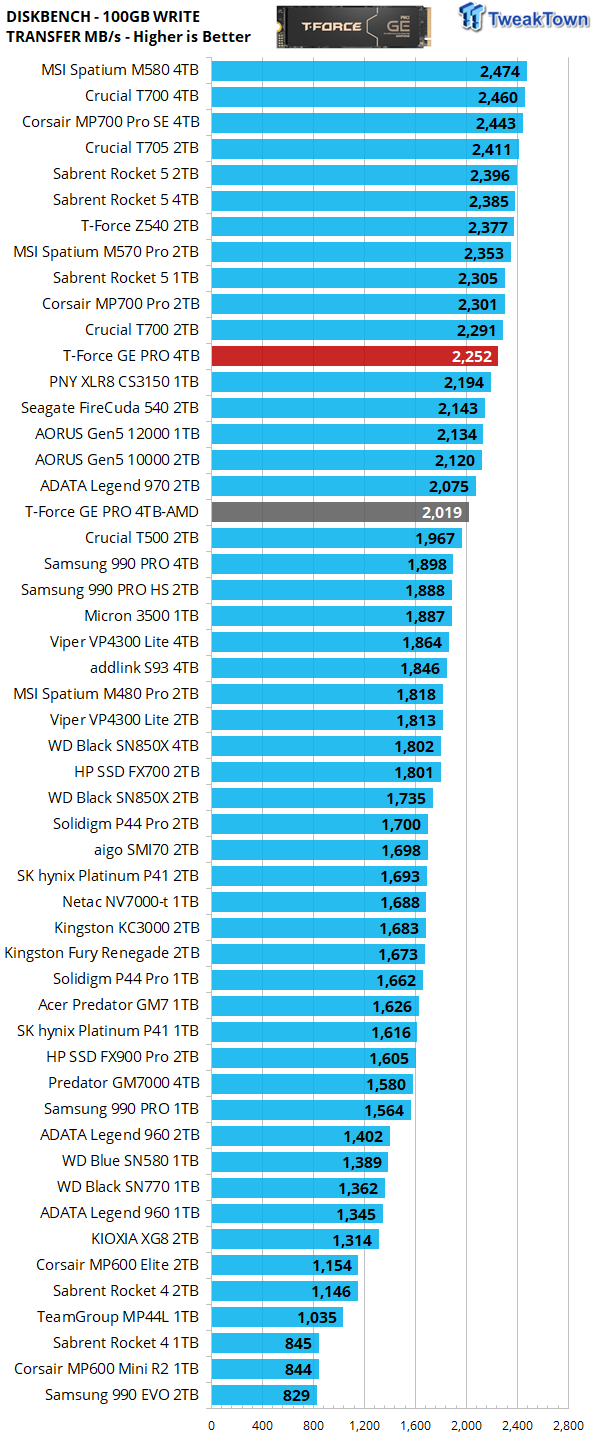
Our 100GB data transfer test is not your ordinary 100GB of data; ours is a crushing mix composed of more than 62K files. Write performance, random or sequential, is an infrequent operation, and as such, we do not consider it to be an important performance metric in the consumer space. An example is how many times a game is installed vs. how many times it's played. At a mere 9% slower than the fastest we've tested to date, this is still a nice result.
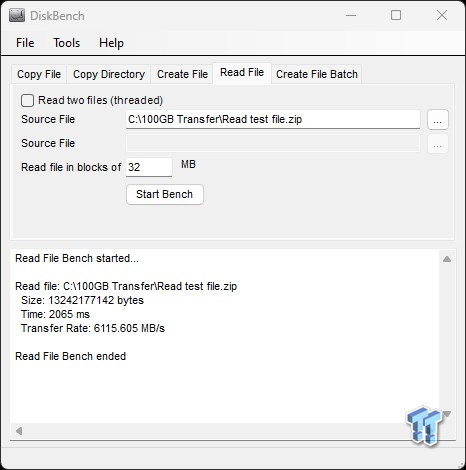
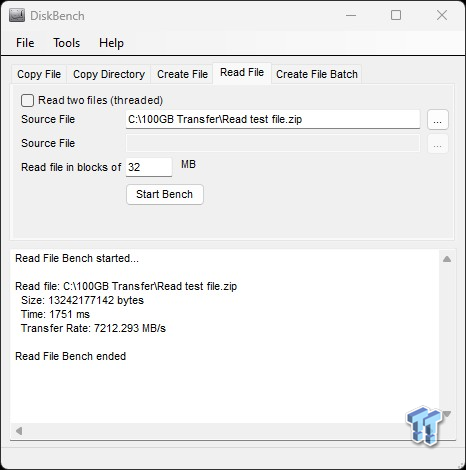
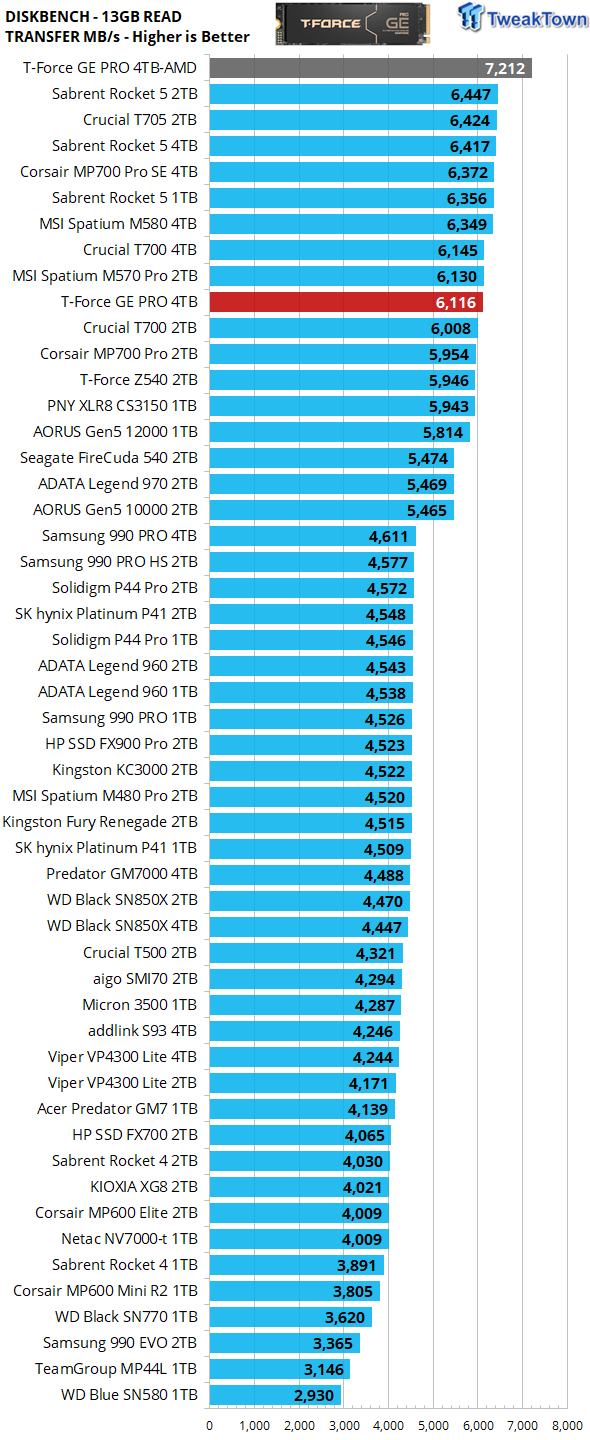
Unlike programming (writing) data, serving data to the host (reading) is typically an important performance metric as it relates to the consumer space. Again, slightly slower than the E26 Max14um SSDs, this time only by 5%, but nonetheless top 10 all-time.
3DMark SSD Gaming Test
UL's newest 3DMark SSD Gaming Test is the most comprehensive SSD gaming test ever devised. We consider it superior to testing against games themselves because, as a trace, it is much more consistent than variations that will occur between runs on the actual game itself. This test is the same as running the actual game, just without the inconsistencies inherent to application testing. In short, we believe that this is the world's best way to test an SSDs gaming prowess and accurately compare it against competing SSDs. The 3DMark SSD Gaming Test measures and scores the following:
- Loading Battlefield V from launch to the main menu.
- Loading Call of Duty Black Ops 4 from launch to the main menu.
- Loading Overwatch from launch to the main menu.
- Recording a 1080p gameplay video at 60 FPS with OBS (Open Broadcaster Software) while playing Overwatch.
- Installing The Outer Worlds from the Epic Games Launcher.
- Saving game progress in The Outer Worlds.
- Copying the Steam folder for Counter-Strike Global Offensive from an external SSD to the system drive.
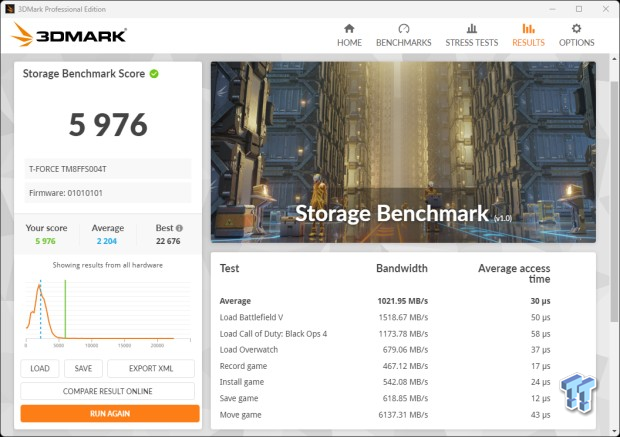
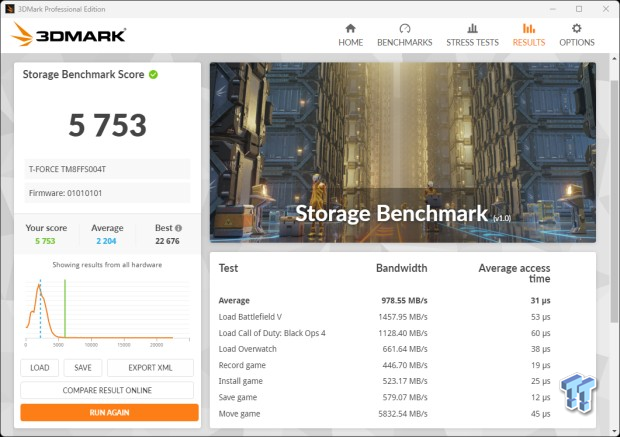
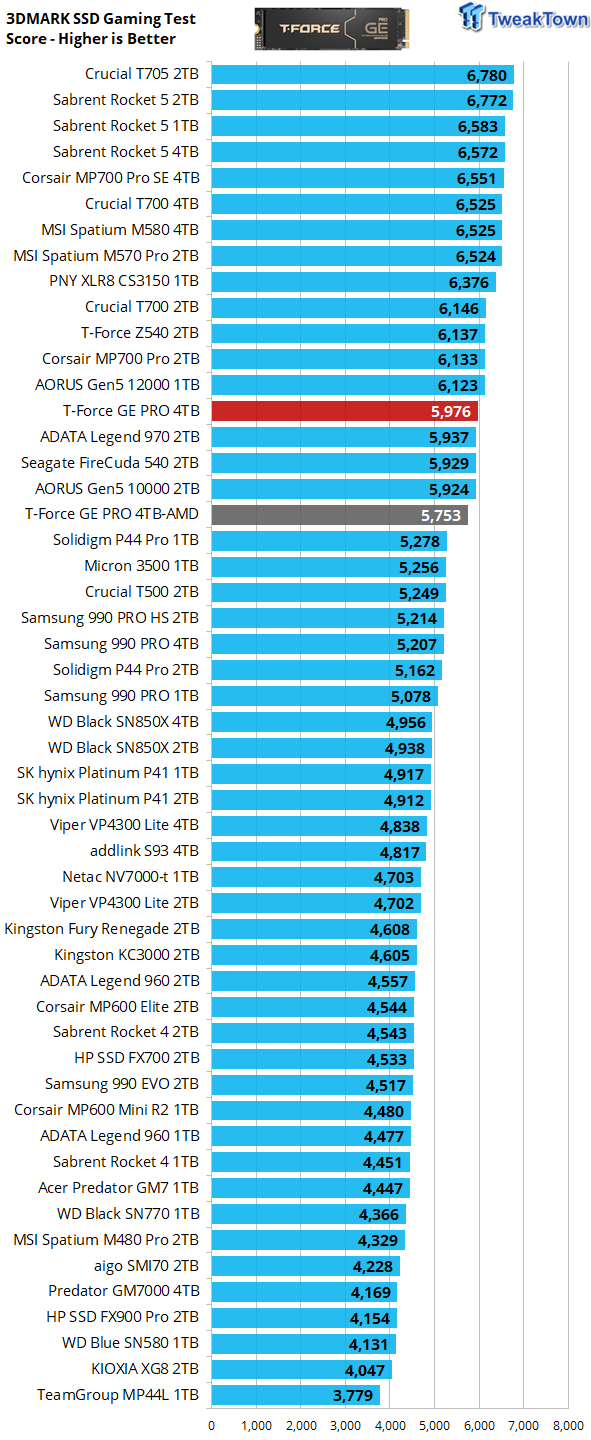
Gaming is a performance metric that matters to most DIY consumers, especially for the enthusiast crowd that TweakTown caters to. Now we've reached the point where results start to matter as they are a direct reflection of user experience. To this point, we've established that 232L YMTC is just as fast as B58R in terms of sequential throughput. However, with the following three tests, we will get a better glimpse of how its architecture compares, at least with the current firmware.
A score of 5,926 is good for 14th place on our chart of 51 SSDs. Overall, this is quite good, significantly better than any PCIe Gen4 SSD can deliver, but it shows us that, like its predecessor, the IG5236, its 4K QD1 throughput may not be a good synthetic indicator of its real-world prowess.
PCM10 Storage Tests
PCMark 10 Storage Test is the most advanced and most accurate real-world consumer storage test ever made. There are four different tests you can choose from; we run two of them. The Full System Drive Benchmark and the Quick System Drive Benchmark. The Full System Drive Benchmark writes 204 GB of data over the duration of the test. These tests directly correlate with mainstream user experience.
PCMark 10 Full System Drive Benchmark
This test writes 204GB data and covers a broad range of common consumer tasks, including booting Windows 10, file transfers, Adobe and Office applications, and startup times for games including Battlefield V, COD Black Ops 4, and Overwatch. Unlike synthetic numbers, this is comprehensive real-world data which is why we use it to rank SSDs in terms of user experience.
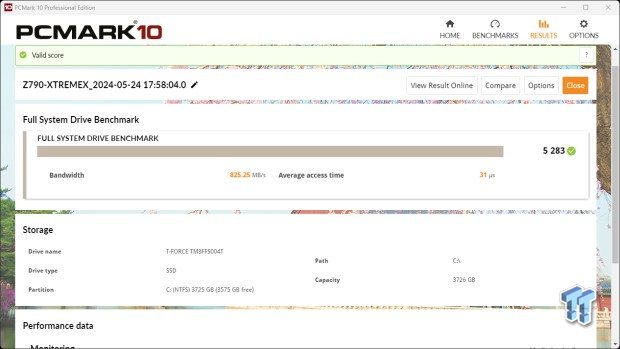
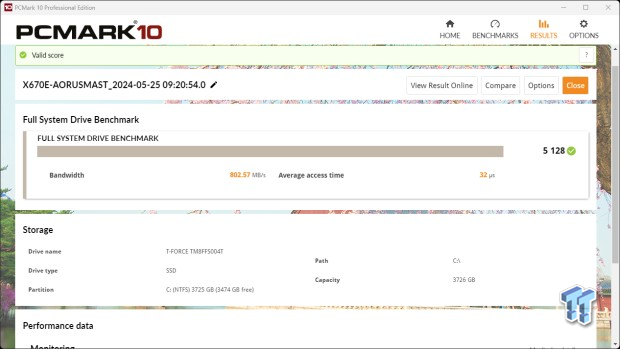
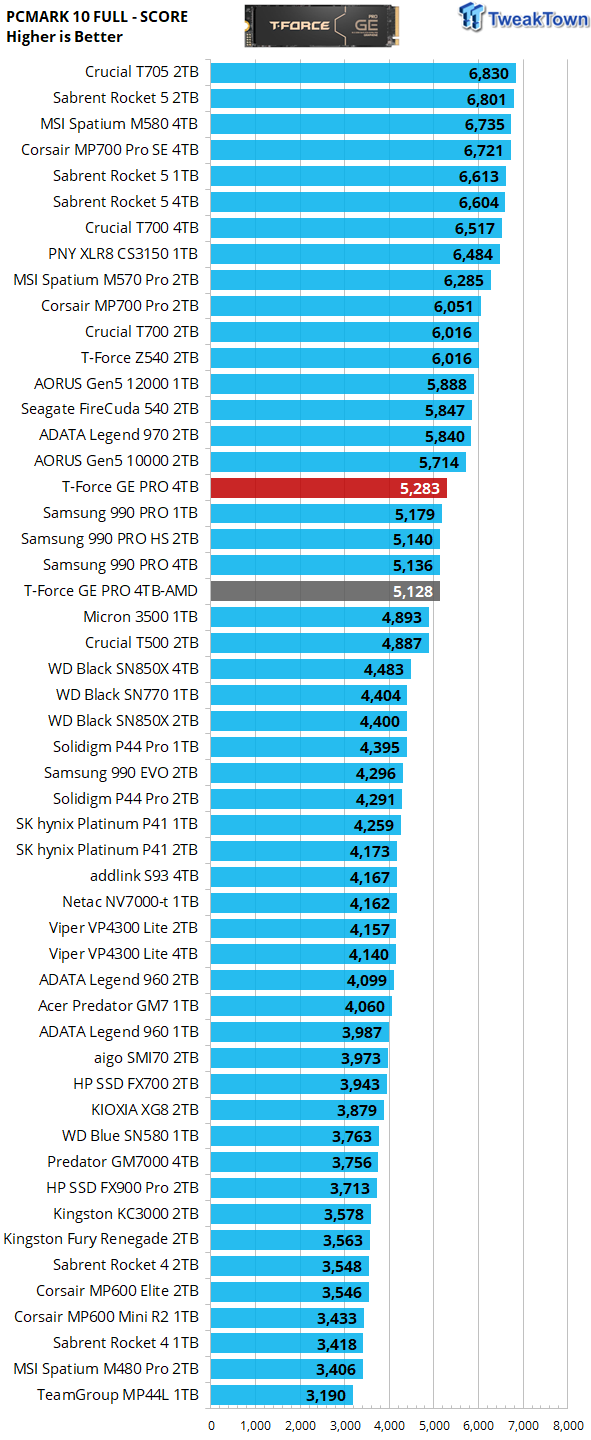
Here we are inclined to think this is where the architectural differences between Micron 232L and YMTC 232L are well parsed, with B58R showing itself the clear winner in terms of architectural superiority. Verification will come as IG5666 firmware matures.
PCMark 10 Quick System Drive Benchmark
The Quick System Drive Benchmark writes 23 GB of data over the duration of the test.
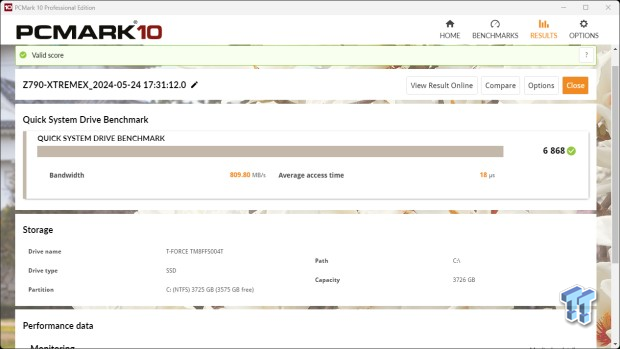
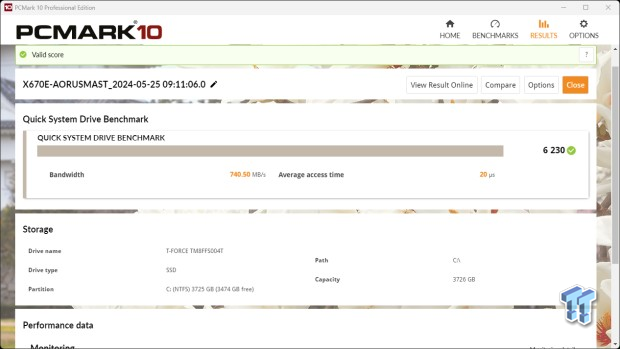
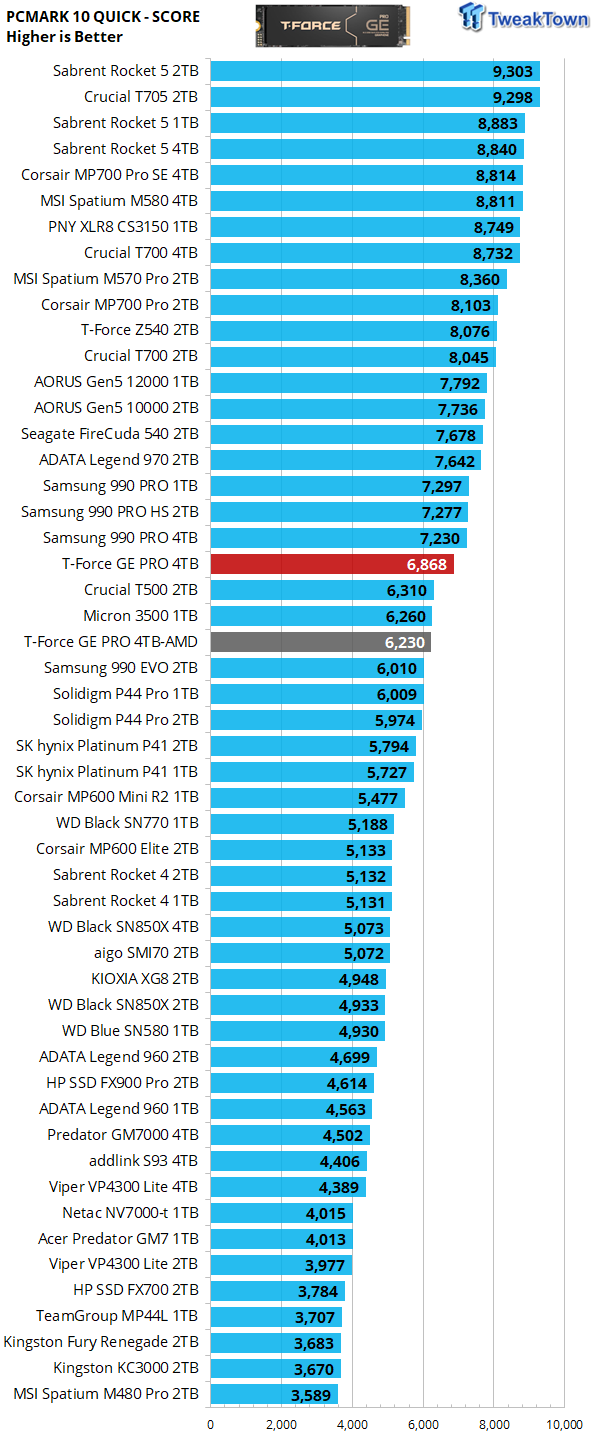
More of the same here, where we will again point to the flash as the likely culprit being architecturally inferior to B58R and Samsung's V-NAND.
Final Thoughts
Even though we did not get the new performance leader we hoped for, we still consider the T-Force GE PRO a big-time success and totally worthy of your hard-earned cash. Even at this early stage, the drive clearly has some advantages over its E26 counterparts. It's 20%-30% cheaper, and our testing indicates it runs about 10c cooler than the E26 Max14um drives. It delivers class-leading sequential throughput at 4TB, about 300 MB/s more than anything we've encountered so far. And finally, it's overall more performant than any flash-based PCIe Gen4 SSD in existence. There is a lot to like about the T-Force GE PRO.
Additionally, we are inclined to believe there is potentially a lot more to be had from the drive as firmware matures. We see the IG5666 as very much like the IG5236 that preceded it in that it took several firmware revisions to extract its true performance potential. Make no mistake, this is one of the most important SSDs ever made.
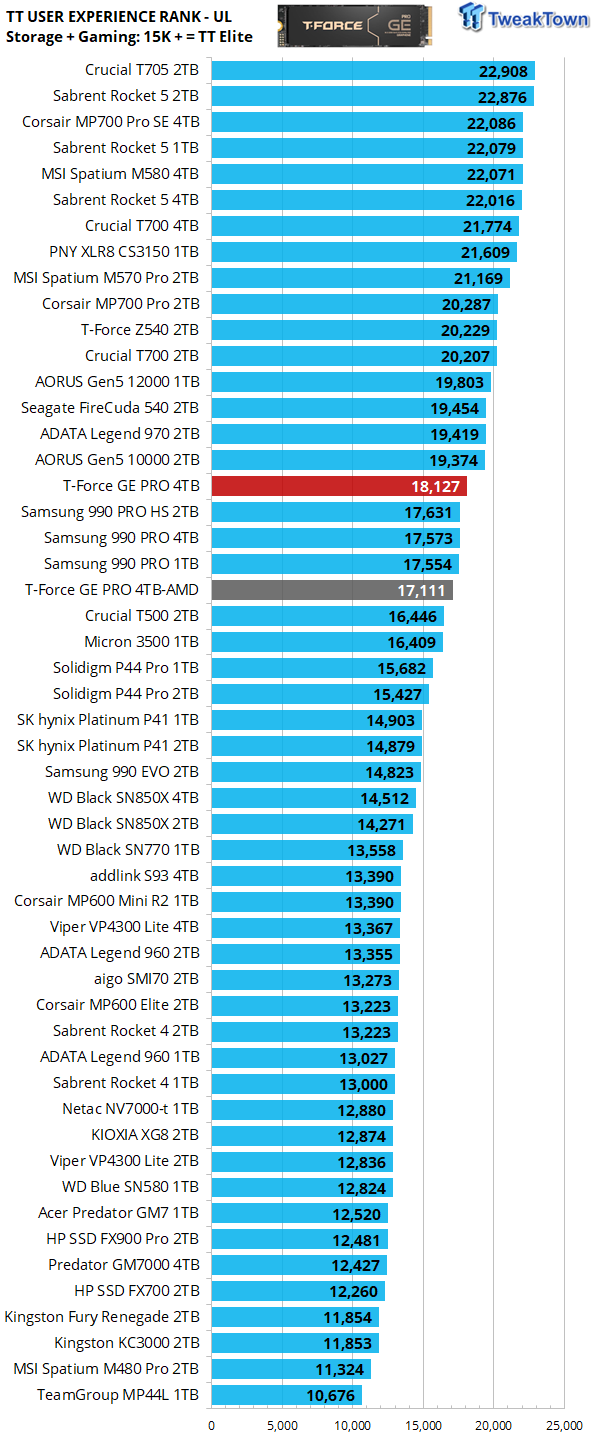
We rank SSDs in terms of overall user experience (performance where it matters most) as expressed by PCMark 10 storage and 3DMark gaming storage tests. Currently, we consider a user experience score of 15K or more to verify an SSD as a TweakTown Elite performer. With a user experience score of 18,127, the T-Force GE PRO 4TB is certified TweakTown Elite and verified as significantly more powerful than any flash-based PCIe Gen4 SSD ever made.
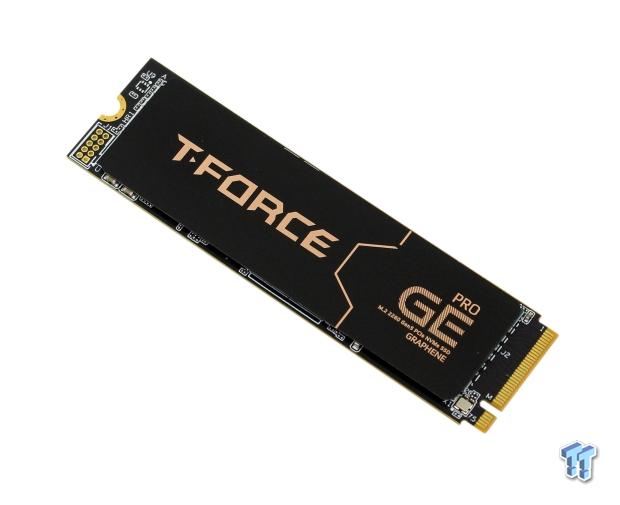
It's one of the best-performing SSDs in the world, earning a well-deserved Must-Have Award.




